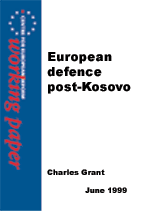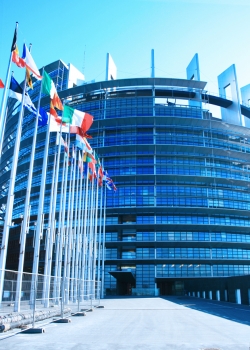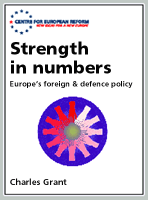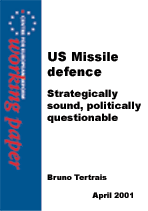European foreign policies & institutions
Issue 14 - 2000
29 September 2000
- European defence: The next steps, Charles Grant, Christoph Bertram, François Heisbourg
- Europe needs an avant-garde, but..., Jacques Delors
- A new institutional vision, Charles Grant
Europe's military ambitions
01 June 2000
The European Union's 'Headline Goal', agreed at the Helsinki Summit in December 1999, calls for the creation of a 60,000-strong rapid-reaction force by 2003. Turning that goal into reality is extremely difficult. To deploy and sustain such a force in a combat zone for a year would require - given...
Issue 12 - 2000
26 May 2000
- Beware the strong euro, Alasdair Murray
- Europe's military ambitions, Klaus Naumann
- Mr Prodi's second chance, Charles Grant
- Federalism's last gasp, Ben Hall
Pooling forces
01 December 1999
After many years of talking about boosting their defence capabilities but doing very little, the Europeans have made substantial progress in 1999. European governments have begun to develop the defence dimension of their common foreign and security policy.
European defence post-Kosovo
04 June 1999
European Union has long talked about building a defence capability, but done very little about it. In the first week of June 1999, however, two events gave a boost to the EU’s military aspirations. At the Cologne summit EU leaders agreed on a scheme that would enable the EU to...
The EU needs defence convergence criteria
01 June 1999
The countries of the European Union spend on defence around 60 per cent of the US defence budget (approximately $145bn versus $265bn). But Europe does not have anything close to half of US capabilities when it comes to strategic lift, strategic intelligence or command and control.
Issue 9 - 1999
27 November 1998
- The treaties need radical reform, Charles Grant
- Pooling forces, Tim Garden, John Roper
- Transatlantic tensions, Charles Grant
- Europe's new economy, Charles Leadbeater, Kitty Ussher
Strength in numbers: Europe's foreign and defence policy
06 September 1996
The countries of the European Union need to speak with a common voice on foreign policy. They share similar fundamental interests, which are sometimes distinct from those of the Americans.
US missile defence: Strategically sound, politically questionable
In Europe, both governments and the broad spread of public opinion have been largely sceptical about, or opposed to, missile defence. Arguments between the Europeans and the Bush administration over missile defence – combined with tensions over the European Security and Defence Policy, and American participation in Balkan peacekeeping operations...









